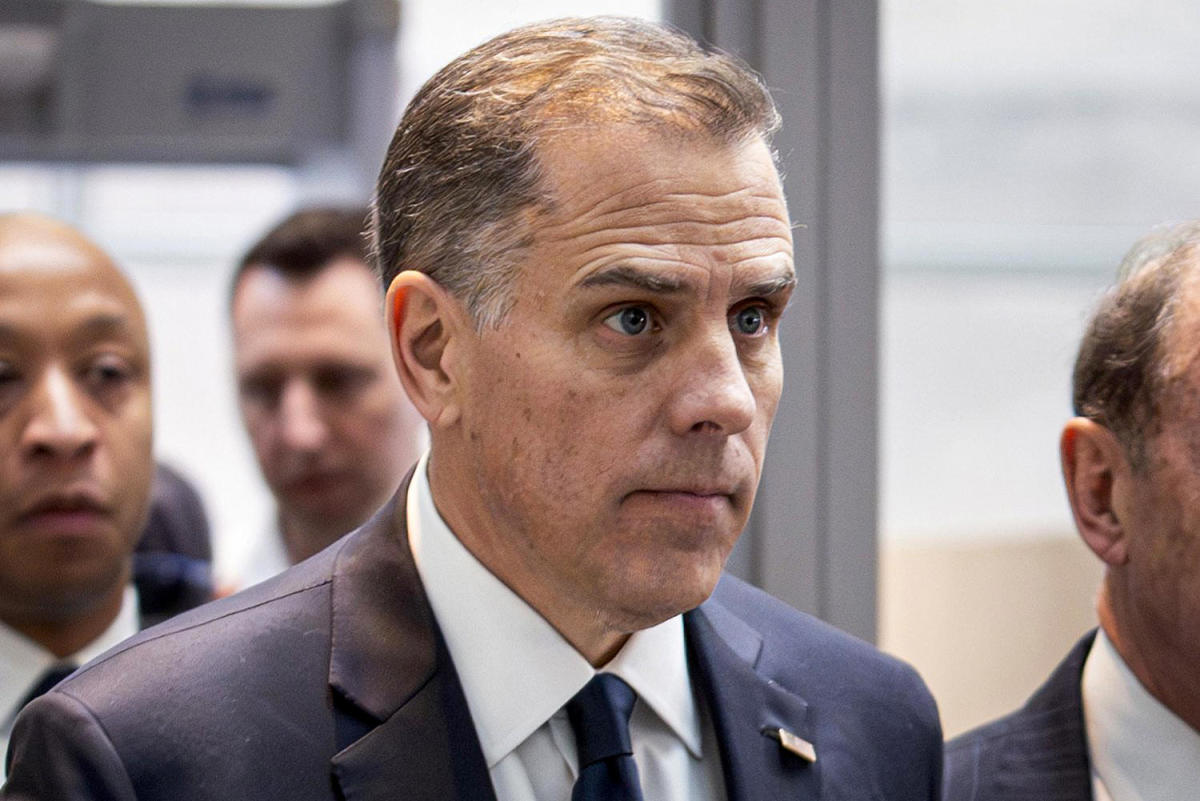The 345-page special counsel report portrays Biden, 81, as someone who haphazardly kept notebooks and documents with classified information at his home, and struggled to recall key dates in his life. Republicans quickly seized on that stinging characterization to attack the Democratic incumbent as unfit for office.
Special counsel Robert K. Hur’s report also said Biden could not remember the year in which his son Beau died of cancer.
“How in the hell dare he raise that,” a furious president said to reporters summoned to the White House on Thursday evening. “It wasn’t any of their damn business. … I don’t need anyone to remind me when he passed away.”
In an exchange with reporters that veered from questions about possible national security crimes to the president’s mental faculties to the ongoing U.S. response to the war in the Middle East, Biden insisted he never improperly shared classified information with anyone and was fit to be president and run for reelection.
“I know what the hell I’m doing,” he declared.
Hur, who interviewed the president at the White House himself, found evidence that Biden “willfully retained and disclosed classified materials to his ghost writer after his vice presidency when he was a private citizen.” The special counsel concluded, however, that the evidence “does not establish Mr. Biden’s guilt beyond a reasonable doubt.” At the news conference, Biden denied disclosing restricted information, saying he was careful to skip over any sensitive material when sharing his notes.
Prosecuting Biden would be “unwarranted” based on a number of factors that would make it difficult to prove beyond a reasonable doubt that he intended to break the law, Hur’s report concluded.
Among the issues examined by investigators was why Biden first told his ghostwriter that he had classified information in his possession back in 2017 but didn’t report it to authorities.
Ultimately, the report said a jury would find Biden to be a sympathetic figure and “a well-meaning, elderly man with a poor memory.” Prosecutors also suggested it might not have struck Biden as noteworthy that he was in possession of classified documents so soon after his term as vice president had ended.
Hur’s report said it would be “difficult to convince a jury that they should convict him — by then a former president well into his eighties — of a serious felony that requires a mental state of willfulness.”
Hur’s team wrote Biden’s case was far different from that of former president Donald Trump, who is being prosecuted for retaining classified documents — including that Biden promptly returned the documents when asked, while Trump declined multiple opportunities to do so.
Richard Sauber, a lawyer for Biden on the documents case, said he was pleased the investigation has ended without charges, emphasizing in a statement that the president “fully cooperated from day one.” Sauber said every administration ends with packing mistakes involving documents, and Biden’s was no different.
Sauber went on, however, to criticize Hur for “a number of inaccurate and inappropriate comments” in the report. “Nonetheless, the most important decision the Special Counsel made — that no charges are warranted — is firmly based on the facts and evidence,” he said.
In a response included in the report, Sauber said, “The report uses highly prejudicial language to describe a commonplace occurrence among witnesses: a lack of recall of years-old events.”
The special counsel team conducted 173 interviews with 147 witnesses, including Biden, and collected millions of documents to compile the report. They said Biden cooperated with investigators and consented to multiple searches of his properties.
The Justice Department has long had a policy that sitting presidents cannot be accused, charged or prosecuted for an alleged crime. But officials said in the report that they would have still decided not to pursue charges even if department policy permitted charging a sitting president.
Hur also revealed in his report that he considered filing criminal charges against Biden’s ghostwriter after learning that he had deleted audio recordings of his talks with Biden during the writing of the memoir.
“The recordings had significant evidentiary value,” the report said. The ghostwriter later told the FBI what he’d done, turned over his computer and hard drive, and consented to their search, during which FBI agents were able to recover all the deleted files, though some portions were missing. Separately, the ghostwriter kept his near-verbatim transcripts of the conversations and turned them over to investigators, the report said. Ultimately, prosecutors decided the evidence of obstruction would not probably lead to a conviction.
The detailed report contained photos of notes Biden took during his time as vice president, showing that he organized his notecards into binders so that he could take them with him after he left office. One binder, for example, had notes on classified meetings and information that Biden took during his daily briefings and lunches with President Barack Obama.
The findings suggest that his aides knew his note-taking methods could be a problem and discussed how he should properly store the materials. The special counsel investigation did not determine what Biden’s staffers advised him to do with the materials. But the report also noted that Biden was an official steeped with knowledge of how classified materials should be stored. They said he was aware that past presidents and vice-presidents kept personal diaries and notes of their time in office — and he believed that his notes could be kept in his home.
Attorney General Merrick Garland appointed Hur — a former Trump-appointed U.S. attorney for Maryland — as special counsel in January 2023 after Biden’s aides said they discovered the materials when they searched his home and office.
At the time, a separate special counsel investigation was underway into Trump’s alleged mishandling of classified documents — a probe that led to 40 federal criminal counts against the former president, including willful retention of national defense secrets and obstruction of justice. Garland has said the special counsel appointments were necessary because both Trump and Biden had indicated that they would be running for president in 2024.
Hur’s report includes a discussion of the Trump prosecution, arguing that there are striking differences between the Trump and Biden cases. Among them: Trump allegedly thwarted officials’ attempts to retrieve the government materials on multiple occasions.
“Unlike the evidence involving Mr. Biden, the allegations set forth in the indictment of Mr. Trump, if proven, would present serious aggravating factors,” the report continues. Most notable among those: “after being given multiple chances to return classified documents and avoid prosecution, Mr. Trump allegedly did the opposite.”
The Republican front-runner for the GOP nomination in 2024, Trump said the decision not to charge Biden was evidence of a two-tiered justice system, subjecting him to worse treatment than his Democratic rivals.
“I did nothing wrong, and I cooperated far more,” Trump claimed. He also repeated his frequent complaint that the Justice Department is engaging in election interference against him by pursuing criminal charges against him even as he runs for office.
Hur’s report portrayed Biden as well-intentioned but sometimes hapless and forgetful, a man who had access to classified materials throughout his decades in government. The special counsel noted that Biden’s 2017 memoir ultimately did not contain classified information.
Prosecutors said that in their interviews with the president, Biden sometimes struggled to recall basic facts about his career and his life — a description that goes to the heart of what polls have showed is his most significant political liability, a sense by voters that he is too old for his office.
“He did not remember when he was vice president, forgetting on the first day of the interview when his term ended (‘if it was 2013 — when did I stop being Vice President?’), and forgetting on the second day of the interview when his term began (‘in 2009, am I still Vice President?’),” the report said.
The report recounted that Biden did not remember “even within several years” when his son Beau died. It also said his memory appeared “hazy” in recounting even the debate over Afghanistan that “was once so important to him.” Biden noted that he agreed to be interviewed for hours in early October, even as he was dealing with the international crisis sparked by Hamas’s attack on Israel on Oct. 7.
Other details in the report could add to the portrait of an aging, absent-minded president. Jurors, Hur wrote, could be “struck by the place where the Afghanistan documents were ultimately found in Mr. Biden’s Delaware home: in a badly damaged box in the garage, near a collapsed dog crate, a dog bed, a Zappos box, an empty bucket, a broken lamp wrapped with duct tape, potting soil, and synthetic firewood.”
In an early sign of how Republicans are likely to use the report against Biden, Republican National Committee Chairwoman Ronna McDaniel said the report demonstrated that Biden has “mental decline” that is “both sad and alarming.”
“Putting a ‘sympathetic,’ ‘elderly’ man who can’t remember major events from his own life back in the Oval Office would undoubtedly make America less safe,” she said.
Prosecutors concluded that Biden saved some of the classified material because he believed he was an important figure in U.S. history and wanted that history to reflect that he opposed sending more troops to Afghanistan in 2009. Biden, the report said, “always believed history would prove him right.”
Some of the classified documents were classified “top secret/sensitive compartmented information,” a category reserved for particularly sensitive material. They included papers that related to Afghanistan, including a 2009 memo he sent to Obama in “a last ditch effort to persuade him not to send additional troops to Afghanistan,” the report said.
The report noted that in a recorded conversation with his ghostwriter in early 2017, shortly after his term as vice president ended, Biden said he had “just found all the classified stuff downstairs.” At the time, Biden was living in a rented home in Virginia.
John Wagner and Jacqueline Alemany contributed to this report.

Amanda Smith is a dedicated U.S. correspondent with a passion for uncovering the stories that shape the nation. With a background in political science, she provides in-depth analysis and insightful commentary on domestic affairs, ensuring readers are well-informed about the latest developments across the United States.



:max_bytes(150000):strip_icc():focal(795x261:797x263)/Kelly-Rowland-tout-052324-853479976add4f69ae3ed4d71685022e.jpg)


/cdn.vox-cdn.com/uploads/chorus_asset/file/25463095/2076702464.jpg)
